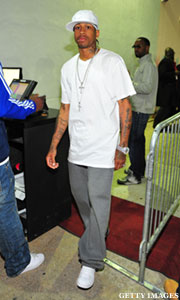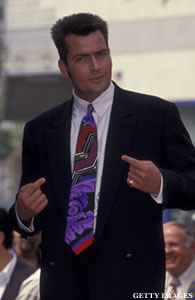Charlie Sheen’s latest rounds of verbal laser tag have elicited three overwhelming reactions from America.
Reaction 1: Crazy.
Charlie Sheen is insane. That’s comfortable. He’s nuts. We’re sane. Cozy nest intact.
Reaction 2: Hilarious.
The guy's word choices are spectacular: “Mercury surfboard,” “10,000-year-old brain and the boogers of a 7-year-old,” “I’m on a drug … it’s called Charlie Sheen!” and the instant classic “tiger blood and Adonis DNA.” That’s not to mention the many other “winning” ninja phrases he unleashed upon faux-concerned TV reporters. Some find his stream-of-consciousness funny because it’s “crazy.” Some, because it’s clever.
Reaction 3: Concern.
These expressions of genuine empathy have often sprung from those who’ve either suffered from addiction or know people who have.

All three reactions are valid. But as usual, in matters of celebrity meltdowns and outrageousness, the way we react says far more about us than him. Which leads us to another colorful Sheen-ism: Comparing himself to “the great Allen Iverson.”
When asked if his partying had ever caused him to miss work, Sheen launched into an impersonation of one of our symbols of reviled sports entitlement. “Not a day that cost anybody any money,” Sheen answered. “I missed practice. I’m talking ’bout practice, to quote the great Allen Iverson. Practice. C’mon guys, we’re talking about practice!”
That moment, right there, should’ve caught our attention as much as “tiger blood.” Unfortunately, the country is not prone to introspection.
Countless athletes, like Iverson, have earned America’s contempt for owning similar well-earned delusions of grandeur. Iverson, actually, is the perfect example here.
Iverson, too, tangled with substance abuse and domestic disputes. He spoke in a conceited manner befitting the bounties we’d heaped upon him for his talent.
But where Sheen’s and Iverson’s seemingly parallel paths forked long ago was when America reacted. Iverson was derided the minute he became a teenager caught up in a bowling alley brawl. Many in America decided he was never worthy of a public opinion pardon. Any perceived transgression henceforth merely validated a "thug" label. So many sports fans couldn’t stop being angry that he got rich and showered in glory when we deemed him unworthy of the spoils.
But Sheen, whose history with substance abuse and violence not only date back further than Iverson’s but is significantly more substantial, has needed to reach this point –- a public PR meltdown after 20 years –- to get our attention. And we’re still not that angry.
The repeated accusations of, and guilty pleas for, violence never really lit a match in the nation’s bellies. Not a bullet in a fiancée’s arm. Not the bruises on a girlfriend’s face. Not death threats. Not the prostitutes. Not the drug abuse. Not accusations of child porn by an ex-wife. In fact, as the website Jezebel points out while placing his transgressions into context, these incidents actually boosted Sheen’s bad boy career. Then Hollywood slapped on some makeup, sanitized that image, and transformed it into an insanely successful television persona.

And even still, here, our reaction to Sheen is 1, 2 or 3.
Not so much 4, the Allen Iverson reaction, the thug reaction, the utter disgust reaction. The inmates-are-running-the-asylum reaction. The can-never-be-forgiven reaction we tend to reserve for athletes (and let’s be honest, we’re talking mostly black athletes).
If Sheen went by his birth name, Carlos Estévez, would we have been so forgiving for so long? Would we have made his pedestrian sitcom “Two and a Half Men” the most-watched show on television?
Maybe that’s why he’s “Charlie Sheen” rather than Carlos Estévez. He’s always known us better than we care to know ourselves. Thus his show starring a misogynistic alcoholic sex fiend became a financial rocket ship.
But we’re wired to begrudge athletes who dare to be black with money, power and fame -- the spoils of naked capitalism that Sheen has unabashedly swallowed, snorted and sexed.
We’re quick to smolder inside when Allen Iverson speaks dismissively about practice, never mind the immeasurable heart his tiny body played with in games. We’re quick to gasp at his cornrows and tattoos. Doesn’t matter if the tattoos honor family and friends. We’re quick to label him selfish, even though his ball-hogging carried a terrible 76ers team to the NBA Finals.
Terrell Owens, Chad Ochocinco, LeBron James, Barry Bonds, etc., have long triggered our hatred because they dare to be boastful, arrogant, eccentric. They dare to act the way society treats them -- special. Some are jerks. We’re free to dislike jerks. But the spitting scorn? Let’s pump the outrage brakes.
Sure, we feel we’ve invested in these men. We buy tickets and they represent our cities. But usually, the boiling contempt is bred in other cities, often by casual fans without a passionate allegiance.
Ask yourself this the next time an athlete refers to himself in the third person or his dance lingers in the end zone or he delivers Sheen-like bravados after climbing atop the Mount Olympus that is our fame machine: Why does it rub us so raw … really?
Certainly, Allen Iverson is far from a flawless man. That’s not the point. The point is how violently our brains reacted to his flaws. And how aw-shucks we’ve reacted to Charlie Sheen’s. One reaction isn’t the obvious right or wrong way. But we can’t have it both ways. The Iversons of the sports world could use a little more of 1, 2 and 3. And maybe the Sheens could stand a little more of 4.
-- Mike Ogle has written for The New York Times, ESPN, New York magazine and Sports Illustrated.




